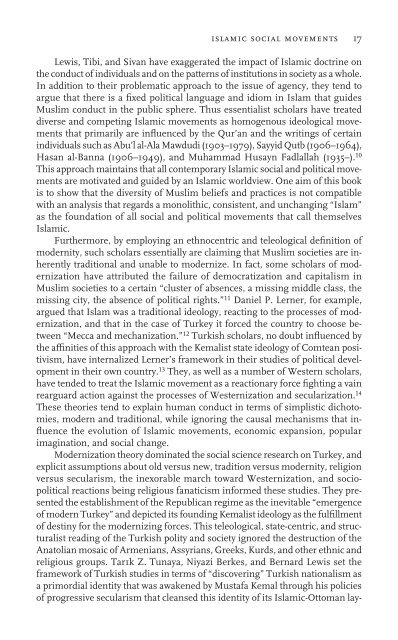Create successful ePaper yourself
Turn your PDF publications into a flip-book with our unique Google optimized e-Paper software.
islamic social movements 17Lewis, Tibi, and Sivan have exaggerated the impact of <strong>Islamic</strong> doctr<strong>in</strong>e onthe conduct of <strong>in</strong>dividuals and on the patterns of <strong>in</strong>stitutions <strong>in</strong> society as a whole.In addition to their problematic approach to the issue of agency, they tend toargue that there is a Wxed political language and idiom <strong>in</strong> Islam that guidesMuslim conduct <strong>in</strong> the public sphere. Thus essentialist scholars have treateddiverse and compet<strong>in</strong>g <strong>Islamic</strong> movements as homogenous ideological movementsthat primarily are <strong>in</strong>Xuenced by the Qur’an and the writ<strong>in</strong>gs of certa<strong>in</strong><strong>in</strong>dividuals such as Abu’l al-Ala Mawdudi (1903–1979), Sayyid Qutb (1906–1964),Hasan al-Banna (1906–1949), and Muhammad Husayn Fadlallah (1935–). 10This approach ma<strong>in</strong>ta<strong>in</strong>s that all contemporary <strong>Islamic</strong> social and political movementsare motivated and guided by an <strong>Islamic</strong> worldview. One aim of this bookis to show that the diversity of Muslim beliefs and practices is not compatiblewith an analysis that regards a monolithic, consistent, and unchang<strong>in</strong>g “Islam”as the foundation of all social and political movements that call themselves<strong>Islamic</strong>.Furthermore, by employ<strong>in</strong>g an ethnocentric and teleological deWnition ofmodernity, such scholars essentially are claim<strong>in</strong>g that Muslim societies are <strong>in</strong>herentlytraditional and unable to modernize. In fact, some scholars of modernizationhave attributed the failure of democratization and capitalism <strong>in</strong>Muslim societies to a certa<strong>in</strong> “cluster of absences, a miss<strong>in</strong>g middle class, themiss<strong>in</strong>g city, the absence of political rights.” 11 Daniel P. Lerner, for example,argued that Islam was a traditional ideology, react<strong>in</strong>g to the processes of modernization,and that <strong>in</strong> the case of <strong>Turkey</strong> it forced the country to choose between“Mecca and mechanization.” 12 Turkish scholars, no doubt <strong>in</strong>Xuenced bythe aYnities of this approach with the Kemalist state ideology of Comtean positivism,have <strong>in</strong>ternalized Lerner’s framework <strong>in</strong> their studies of political development<strong>in</strong> their own country. 13 They, as well as a number of Western scholars,have tended to treat the <strong>Islamic</strong> movement as a reactionary force Wght<strong>in</strong>g a va<strong>in</strong>rearguard action aga<strong>in</strong>st the processes of Westernization and secularization. 14These theories tend to expla<strong>in</strong> human conduct <strong>in</strong> terms of simplistic dichotomies,modern and traditional, while ignor<strong>in</strong>g the causal mechanisms that <strong>in</strong>-Xuence the evolution of <strong>Islamic</strong> movements, economic expansion, popularimag<strong>in</strong>ation, and social change.Modernization theory dom<strong>in</strong>ated the social science research on <strong>Turkey</strong>, andexplicit assumptions about old versus new, tradition versus modernity, religionversus secularism, the <strong>in</strong>exorable march toward Westernization, and sociopoliticalreactions be<strong>in</strong>g religious fanaticism <strong>in</strong>formed these studies. They presentedthe establishment of the Republican regime as the <strong>in</strong>evitable “emergenceof modern <strong>Turkey</strong>” and depicted its found<strong>in</strong>g Kemalist ideology as the fulWllmentof dest<strong>in</strong>y for the moderniz<strong>in</strong>g forces. This teleological, state-centric, and structuralistread<strong>in</strong>g of the Turkish polity and society ignored the destruction of theAnatolian mosaic of Armenians, Assyrians, Greeks, Kurds, and other ethnic andreligious groups. Tar1k Z. Tunaya, Niyazi Berkes, and Bernard Lewis set theframework of Turkish studies <strong>in</strong> terms of “discover<strong>in</strong>g” Turkish nationalism asa primordial identity that was awakened by Mustafa Kemal through his policiesof progressive secularism that cleansed this identity of its <strong>Islamic</strong>-Ottoman lay-




